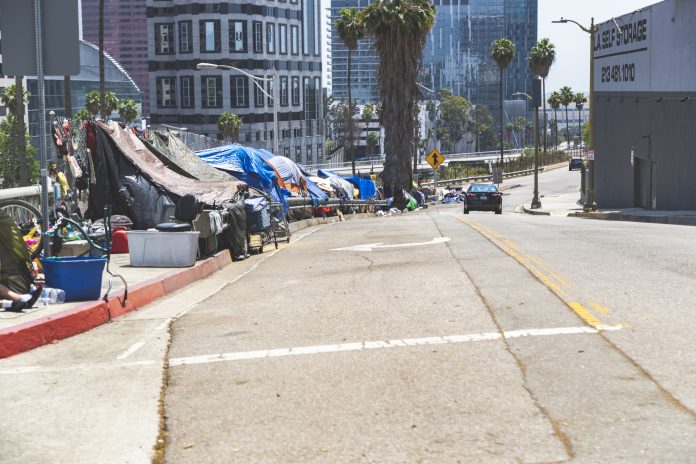
A BALLOT MEASURE in Los Angeles that would have required hotels in the city to house the homeless along with paying guests has been officially withdrawn from consideration. However, the Los Angeles City Council also passed an ordinance to replace the ballot measure that some local hoteliers also protest its passage.
The ballot measure, sponsored by Unite Here Local 11 hospitality workers union, would have required hotels to house homeless voucher holders with regular guests, spurring protests by AAHOA, the American Hotel & Lodging Association and others. Last week, Unite Here agreed to withdraw that ballot measure, which was going to go before voters in March.
Also last week, the council approved the Responsible Hotel Ordinance to replace the ballot measure and that would allow hotels to voluntarily make vacant rooms available for interim housing for the homeless. It also would require developers of new hotel properties to obtain a conditional use permit through a public review of the proposed development’s impact on the existing housing supply and to replace any housing that would be demolished or otherwise lost in the neighborhood.
Also, hotel developers and owners of existing hotels, as well as owners of short-term rental properties, would be required to obtain a police permit that would screen owners and operators of those properties for prior criminal activity or any history of creating a public nuisance. The ordinance is now awaiting the signature of Los Angeles Mayor Karen Bass.
Several hoteliers and short-term rental property owners attended the meeting in early November during which the new ordinance was introduced and took issue during public comments, particularly with requirement for a police permit. Ray Patel, president of the Northeast Los Angeles Hotel Owners Association, was among them.
Patel said at that meeting that the council should take more input from local hoteliers before passing the ordinance. He was not happy with last week’s action.
“I am not happy with the new ordinance,” Patel said. “The association will continue to fight the new ordinance which imposes a police hotel permit section.”
The protest continues
AHLA and AAHOA both praised the withdrawal of the Unite Here ballot measure.
“For nearly two years, Unite Here created an atmosphere of dangerous uncertainty for hotel employees, hoteliers and the city of Los Angeles by clinging to a proposal virtually everyone thinks is outrageous – forcing hotels to house homeless people next to paying guests,” said Chip Rogers, AHLA president and CEO. “[The] vote by the council removes Unite Here’s ridiculous homeless-in-hotels proposal from the ballot, and the union’s consent to this vote makes clear that its irresponsible demand was just a bargaining chip, rather than a serious attempt to address the homelessness crisis gripping L.A.”
AAHOA said in its statement the voluntary housing component of the new ordinance is an improvement over the previous ballot measure.
“This prudent compromise will avoid turning all Los Angeles hotels into temporary homeless shelters that do not have the necessary wrap-around services to care for those who might be suffering from physical disabilities, mental health challenges, or related concerns,” the association said. “It will therefore protect the housekeepers who would be on the front lines to assist with such challenges, but also the visitors who might otherwise make plans to stay outside of the city to avoid such concerns.”
At the same time, the association said it also thinks some changes should be made to the police permitting section of the ordinance are recommended. For example, while most government entities provide an amortization period of 20 to 25 years when imposing a new permitting process for existing buildings and or businesses, the new Los Angeles ordinance does not.
The police permitting requirement also would lead to uncertainty for hoteliers because they will not know each year if they will receive the permit or not, AAHOA said. Banks might avoid renewing hotel loans and demand immediate full payment of loans from hoteliers and hoteliers may be discouraged from investing in their properties due to the uncertainty.
“This section imposes an onerous process that, among other things, could potentially lead to the denial of a hotel permit for up to five years with no rights to appeal if a hotel is ‘found’ by an unspecified adjudicator to have violated any federal, state, or local employment laws,” AAHOA said. “It also generally references prohibited activities that are broadly worded and nonspecific and might arise because of unruly guests’ activities that a hotel owner has worked hard to prevent.”
AAHOA is asking that the Los Angeles Planning and Land Use Management Committee consider the impact the police hotel permit on the local hotels, especially the limited-service hotels owned by minority and immigrant hoteliers.
“A diminution in the value of the hotels and/or an inability to obtain or maintain financing will be most detrimental to those who need the most protection,” AAHOA said.
Paul Krekorian, L.A. Council president responded to concerns about the police permit requirement during the first meeting in November. Specifically, he addressed his response to short-term rental hosts who were concerned that police would inspect their properties.
“The draft ordinance that’s before us today would already provide for automatic acceptance of an application for the police permit. All you have to do is apply and unless there is opposition presented by someone that application will automatically be approved,” Krekorian said. “So, there’s not going to be a police inspection of your home or any of the other things that were said. There will be automatic approval unless there’s a reason for opposition.”




